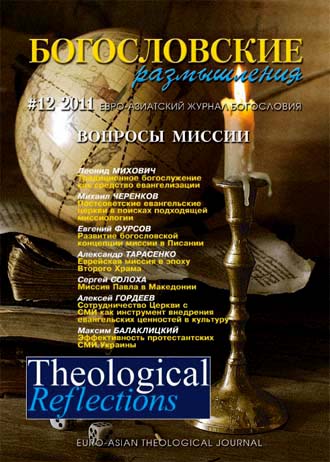Development of Theological Concept of Mission in Scripture
Keywords:
Development of Theological Concept of Mission in Scripture, traditional understanding of mission, Old Testament points to the redemptive character of mission, Church's missional relation to the worldAbstract
The traditional understanding of mission is based on the Great Commission in Matt. 28:19-20. As a result mission is often considered as feature of the New Testament period which to some degree restrains its understanding. This article explores development of the concept of mission in Scripture with the purpose of defining in which way both Old and New Testaments represent the wholeness of the concept of mission. In the first part of the article the author considers God's covenants with Noah, Abraham, and also the Sinaic covenant, emphasizing the missional nature of the covenants. From a theological perspective the Old Testament points to the redemptive character of mission. In the second part the author explores God's missional relation to the world and also raises the question of the Church's missional relation to the world. Thus the Church's mission is not only about following the Great Commission’s “to go”, but also about “being”. Within this framework the mission of the Church can obtain different forms, meeting physical, emotional and spiritual needs of people.References
- Bosch, David, Transforming Mission (New York: Orbis Books, 1991).
- Dorr, D., Mission in Today’s World (New York: Orbis Books, 2000).
- DuBose, Francis M., God Who Sends (Nashville: Broadman Press, 1983).
- Goheen, Michael W., ‘As the Father Has Sent Me, I Am Sending You: Lesslie Newbigin's Missionary Ecclesiology’, International Review of Mission, 91 no 362 Jl., (2002).
- Kaiser, Jr. Walter C., Mission in the Old Testament: Israel as a Light to the Nations (Baker Books, 2000).
- Karotemprel, S., Following Christ in Mission (Boston: Pauline Books & Media, 1996).
- Klaiber, Walter, Call and Response (Nashville: Abingdon Press, 1990).
- Kogan, M. ‘Abrahamic Faith’ in McLean, George, F., (chief ed.), Abrahamic Faiths, Ethnicity, and Ethnic Conflicts (The Council for Research in Values and Philosophy, 1997).
- Longman III, T., How to Read Genesis (Downers Grove: InterVarsity Press, 2005).
- Messer, Donald E., A Conspiracy of Goodness (Nashville: Abingdon Press, 1992).
- Moltmann, Jurgen, The Church in the Power of the Spirit: A Contribution to Messianic Ecclesiology (Minneapolis: Fortress Press, 1977).
- Montgomery, H.B., The Bible and Missions (Texas: Baylor University Press, 2009).
- Penner, P., Bible and Mission (Schwarzenfeld: Neufeld Verlag, 2008).
- Routledge R., Bible and Mission (Schwarzenfeld: Neufeld Verlag, 2008).
- Rzepkowski, H., The Theology of Mission (Verbum SVD vol. 15, 1974).
- Scherer, James A., Gospel, Church, & Kingdom (Minneapolis: Augsburg Publishing House, 1987).
- Verster, Pieter, A Theology of Christian Mission (Lewiston: The Edwin Mellen Press, 2008).
- Vicedom, Georg, F., The Mission of God (Saint Louis: Concordia Publishing, 1965).
- Webber, Robert E., Journey to Jesus’ (Nashville: Abingdon Press, 2001).
- Wells, Jo Bailey, ‘God’s Holy People: A Theme in Biblical Theology’, JSOT Supplements 305, Sheffield, (2000).
- Wolanin, Adam, S.J., ‘Trinitarian Foundation of Mission’ in Karotemprel S., (chief ed.), Following Christ in Mission (Boston: Pauline Books & Media, 1996).
- Wright, Christopher J.H., The Mission of God (Nottingham: InterVarsity Press, 2006).
- Yoder, Perry B., ‘The Noachide covenant and Christian Mission’, in Schertz, Mary H., and Friesen, Ivan, (eds.), Beautiful Upon the Mountains (Elkhart: Herald Press, 2003).
Downloads
How to Cite
Issue
Section
License
Copyright (c) 2020 Evgeny FURSOV

This work is licensed under a Creative Commons Attribution-NonCommercial 4.0 International License.
All articles published in the Journal are distributed under a Creative Commons Attribution-NonCommercial 4.0 International License
By submitting an article for publication in Theological Reflections: Eastern European Journal of Theology the author grants the editors the right to publish the article and distribute it in electronic and print form.
The author reserves all copyrights and the right to use the materials of the article in whole or in part for educational purposes, to write his own dissertations, to prepare abstracts, conference reports, oral presentations, etc., as well as post electronic copies of articles (including the final electronic version downloaded from the journal’s official website) on non-commercial web-resources without the consent of the editorial board and founders.



